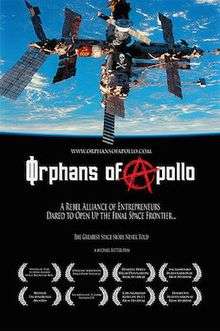Orphans of Apollo
| Orphans of Apollo | |
|---|---|
 | |
| Directed by | Becky Neiman & Michael Potter |
| Produced by | Michael Potter |
| Starring | Rick Tumlinson |
| Edited by | Todd Jones |
Release date |
|
| Country | United States |
| Language | English |
Orphans of Apollo is a documentary film directed and produced by Michael Potter, co-directed by Becky Neiman and edited by Todd Jones, which describes how a band of entrepreneurs tried to privatize the space station Mir and tells the story that led to the development of MirCorp. It features prominent NewSpace entrepreneurs and space advocates (Rick Tumlinson, Jeffrey Manber), backed financially by Walter Anderson.[1][2][3]
Background
MirCorp founder Walt Anderson’s highest-profile venture was an audacious plan to take over the Russian space station Mir—which was being abandoned by the Russian space agency—and turn it into a commercial outpost in orbit. That effort ultimately failed. Some argue MirCorp was done in by a US government that wanted to squelch any potential competition to the ISS. The film’s title refers to those people who came of age during the early years of the Space Age and expected to see progress continue at the rate seen in those heady early days, only to be disappointed—orphaned—by events of the last few decades. If they were going to have the kind of bold future they once envisioned, they would have to build it themselves. And, with MirCorp, that’s what they tried to do.[4] In honor of the 50th anniversary of the Smithsonian Institution, an exclusive screening of Orphans of Apollo was shown in the National Air and Space Museum’s Lockheed Martin IMAX Theater.
Synopsis
Orphans of Apollo is a documentary film based on a group of entrepreneurs heading MirCorp, who negotiate a business deal with the Russian government to lease the Mir space station for commercial use. The film covers the historical period from the time of President Nixon’s decision to end the NASA Apollo Moon program to post-Soviet Russia. More than solely a high-tech space story, the film includes themes of international negotiation, the power of entrepreneur vision, failed effort, and of course political power play. The film combines archival Russian film footage, archival NASA film footage, and IMAX footage, with interviews and original footage of the major players in the project including Walt Anderson, Richard Branson, Tom Clancy, Jeffrey Manber, Rick Tumlinson and others. The documentary has sufficient action to move it along quickly.
Michael Potter
Michael Potter is currently a Senior Fellow at the International Institute of Space Commerce. Formerly, Potter worked as an international telecommunications analyst at the Center for Strategic and International Studies (CSIS) in Washington, D.C.[5] Potter was one of the founders of Esprit Telecom, a successful European telecommunications company, where he was president until leaving to establish Paradigm Ventures, a high-technology venture capital firm.[6] Potter was also a founding member of the European Competitive Telecommunications Association (ECTA). The ECTA pushed for deregulation of telecommunications markets across Europe as a result of commercial practices by former monopolies to limit activities by resellers to access networks and obtain low pricing for the new operators.
Accolades
Winner of the Space Frontier Foundation’s Vision of the Future 2008 award
See also
- Black Sky: The Race For Space, a documentary about NewSpace venture
- Mojave Magic: A Turtle's Eye View of SpaceShipOne
References
- ↑ "Preview: Orphans of Apollo". The Space Review. July 28, 2008.
- ↑ "Orphans of Anderson: Film Examines the Fall of Mir and a Tech Mogul". parabolic arc. March 16, 2009.
- ↑ "Past and future of 'New Space'". cosmiclog on msnbc. 22 May 2009.
- ↑ Foust, Jeff (July 28, 2008). "Preview: Orphans of Apollo". The Space Review. Retrieved 29 January 2013.
- ↑ Moser, Geraldine. "Senior Fellows". International Institute of Space Commerce. IISC. Archived from the original on 28 November 2010. Retrieved 16 January 2013.
- ↑ Cane, Alan (Jan 27, 1999). "Potter leaves Esprit Telecom to set up new business People on the Move". Financial Times. Retrieved 3 February 2013.